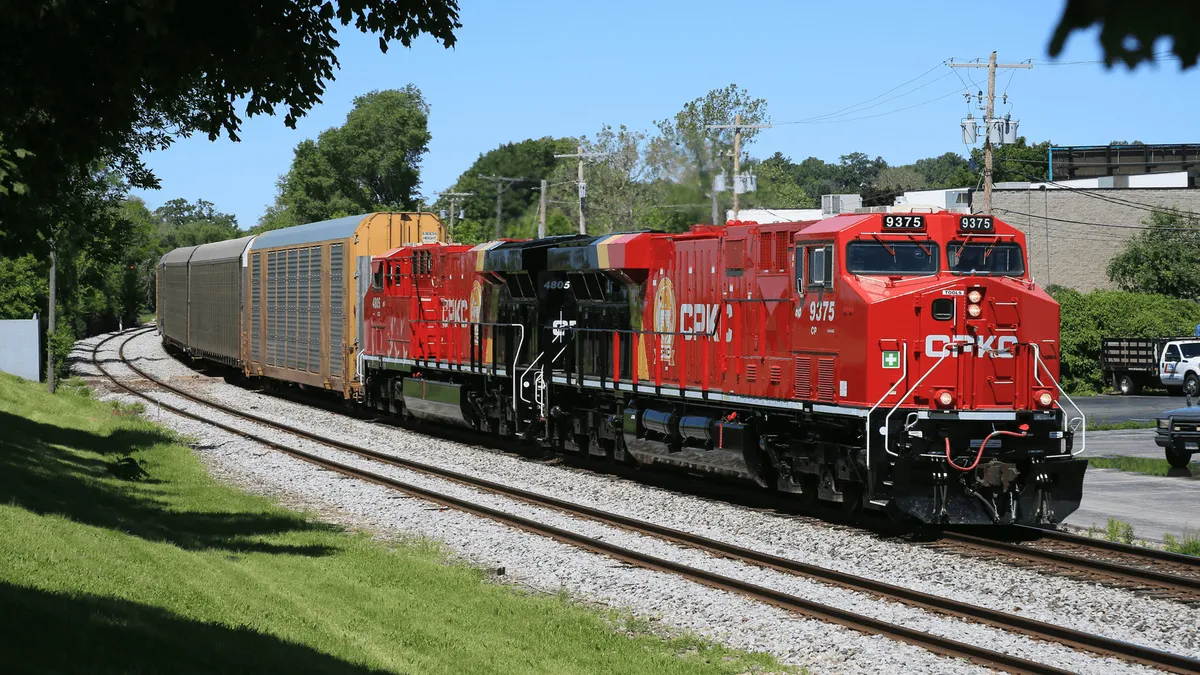Canada’s major rail carriers are imposing more freight embargoes as they prepare for a potential work stoppage later this month, according to service notices issued Tuesday.
Canadian National Railway said it will impose an intermodal embargo on U.S. shipments destined for Canada on its network beginning at 12:01 a.m. EDT Friday.
Meanwhile, Canadian Pacific Kansas City outlined limits for refrigerated container movements that would start on Wednesday, Thursday, Friday or Sunday, depending on the shipment's origin. As an example, Wednesday is the last day for some equipment starting in Vancouver, whereas refrigerated containers starting in Laredo, Mexico, have until Sunday to ship.
The latest moves by CN and CPKC come a day after each railroad embargoed shipments of hazardous items.
Both railroads are taking these measures in response to potential strike action by members of the Teamsters Canada Rail Conference. The union’s contract with the railroads expired at the end of last year, and while previously stalled talks reopened last week, all parties are currently at an impasse. If no deal is reached, a potential work stoppage could occur as early as Aug. 22 following a Canada Industrial Relations Board ruling last week.
Rail made up 25% of all value derived from Canada’s agricultural exports into the United States in 2023, and a work stoppage would particularly impact producers of grains and oilseeds. While Canada has faced the potential for work stoppages in the past, this would be the first time that both of the country’s major railroads are simultaneously shut down.
“The economic repercussions of rail work stoppage of this magnitude would be devastating locally, and given the interconnectivity, consequently impact the movement of goods in United States and beyond,” according to a Thursday report from the U.S. Department of Agriculture.
The labor strife escalation between Canada’s major railroad operators and the union has put logistics contingency planning into overdrive to curtail potential supply chain disruptions.
Jason Hilsenbeck, president of LoadMatch and Drayage.com, said embargoes can create chaos for other modes of freight.
A likely alternative for transporting domestic 53-foot intermodal containers by rail will be using over-the-road trucking, which will cause a spike in OTR cross-border and intra-Canada dry van rates, he said in a LinkedIn message to Supply Chain Dive.
Hilsenbeck added that rerouted ocean containers could be the driver behind recent spikes in international container volume at ports in Washington, New York and New Jersey, which can be transported to other destinations by truck.
“If ocean container[s] can't be transloaded out of 20/40' [centers] then that cargo will just sit until CN/CP vs Union get the contract done,” he said.
Avoiding service disruption is a priority, according to C.H. Robinson Worldwide. Scott Shannon, VP for Canada, said the company has already been handling inquiries from shippers seeking help with spot freight.
“But any time you have an event that causes a surge in trucking demand and sudden tightening of capacity, costs in the spot market can increase dramatically,” Shannon said.
On Wednesday, the United States' Surface Transportation Board said it is monitoring the potential disruption to rail networks in Canada, as it could affect U.S. supply chains.
Sarah Zimmerman contributed to this story.












